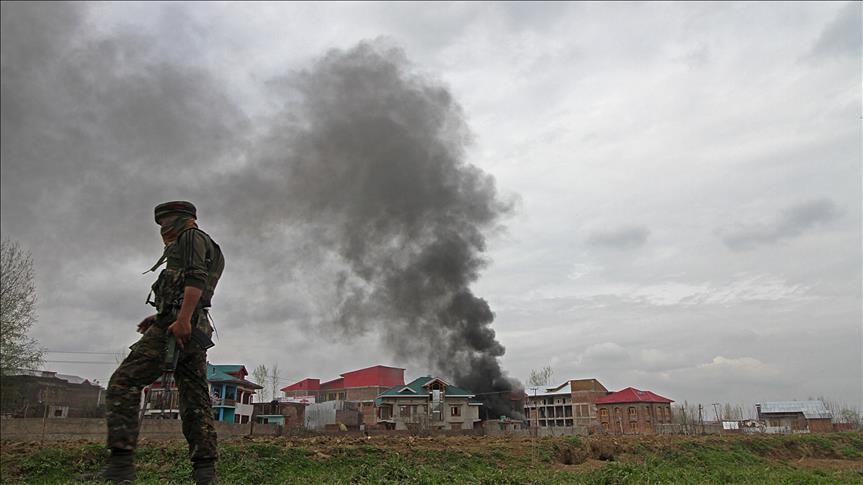Head of Jammu Kashmir calls for peace talks
Only way to resolve dispute is dialogue with pro-independence leaders, says Mehbooba Mufti

Jammu and Kashmir
By Zahid Rafiq
SRINAGAR, Jammu Kashmir
The chief minister of Jammu Kashmir has said dialogue with pro-independence leaders is the only way to resolve the regional dispute.
In an interview with the Indian newspaper, The Hindu, Mehbooba Mufti on Monday said she had not yet given up on the possibility of talks.
“I have not given up. What is the other option for us? Even if we go to war, what will change? I hope some part of the government may be reaching out to them [resistance leadership],” Mufti said.
She said there is a need to open Kashmir to the whole world.
“Why can’t we have, for example, an advisory council between the two Kashmirs, who meet once or twice a year and discuss trade, tourism and environmental issues? I know it sounds unrealistic, but I don’t see a better solution.”
Mufti also blamed the media for confusing dialogue with appeasement.
“Unfortunately dialogue or engagement is confused with appeasement. As soon as one says the word dialogue, electronic media and others say you are appeasing the separatists [resistance leadership], appeasing the other side. Dialogue is engagement for reconciliation,” she said.
Mufti, 57, came to power in 2015 replacing her father, Mufti Mohammad Sayeed, who died as the chief minister of the region.
- ‘World’s most disciplined army’
Mufti's party, the People's Democratic Party, formed the government with the Hindu right-wing Bharatiya Janata Party (BJP) in 2014 after the elections threw up a hung verdict.
Before the 2014 elections, Mufti and her father were urging people to vote for them to stop the "communal footsteps of BJP from coming to Kashmir". Their subsequent alliance with BJP almost wiped off their support base in the south Kashmir.
In the interview, Mufti also brushed aside cases of gross human rights violations in Jammu and Kashmir, calling the Indian army as the "world's most disciplined army".
While calling the use of human shield by the Indian army “unacceptable”, she suggested it was the first time such a human rights violation had been carried out by the troops.
The use of human shields by the Indian army, a practice prevalent across Jammu and Kashmir since the 1990s, made news when the video of a young Kashmiri man tied to an army vehicle became viral in April.
"If you look at the basic fundamental issue of how our army works, it is the world’s most disciplined army, and for the first time with this kind of picture all over the world, it got us a very bad name. Certain people may say that there was no alternate option, but it is simply not acceptable," she said.
A year after Mufti took charge, a popular anti-India revolt was sparked off in south Kashmir by the killing of a 22-year-old Kashmiri militant commander, Burhan Wani, in a gunfight with Indian forces in July.
Tens of thousands of people took to the streets seeking independence from the unpopular Indian rule.
- Surge of Indian troops in Kashmir
The revolt lasted around four months with India sending additional soldiers to contain the people. Around 100 civilian protesters were killed by the Indian forces and, according to hospital records, around 15,000 were wounded, several of them permanently blinded.
In the first six months of 2017, a total of 97 militants, 27 civilians and 39 Indian armed forces have been killed. According to police records, 58 youth have joined militancy, out of which 45 are from Mufti's former stronghold south Kashmir.
Earlier this month, at least seven Hindus, who had come for the Amarnath pilgrimage, were killed in an alleged militant attack in south Kashmir.
Kashmir, a Muslim-majority Himalayan region, is held by India and Pakistan in parts and claimed by both in full. A small sliver of Kashmir is also held by China.
The two countries have fought three wars – in 1948, 1965 and 1971 – since they were partitioned in 1947, two of which were fought over Kashmir.
Kashmiri resistance groups in Jammu Kashmir have been fighting against Indian rule for independence, or for unification with neighboring Pakistan.
More than 70,000 people have reportedly been killed in the conflict since 1989. India maintains more than half a million troops in the disputed region.
Anadolu Agency website contains only a portion of the news stories offered to subscribers in the AA News Broadcasting System (HAS), and in summarized form. Please contact us for subscription options.







